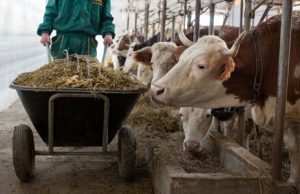[breadcrumb]
How Can Sheep, Goat or Cattle Farmers Get Mesothelioma by Occupational Exposure to Asbestos?
Farmers raise sheep, goats and cattle to extract products from them and to use them for their meat for human consumption. Goat farming is a branch of animal husbandry. Goat farmers primarily raise these animals for their meat, milk, fiber and skin. Butter and cheese can also be made from goats. Many farmers raise a variety of animals at the same time, including sheep and cattle. Goats often help make grazing areas more suitable for other animals. While herding goats on land, farmers could have breathed in asbestos from soil that occurred naturally or from products used on the soil that contained asbestos, such as pesticides, animal feed or fertilizer.
Sheep are also used in animal husbandry. They are used for their meat, milk and fiber. Sheepskin and parchment can also be used from sheet. Sheep raising often requires the building of fences, housing and shearing sheds. Many construction materials before the 1980s contained asbestos because this material is resistant to heat and electricity. These materials included siding, roofing materials, insulation and shingles. Therefore, when constructing or repairing these facilities, these farmers could have been exposed to asbestos from these materials.
Locations in the United States for the Highest Employment Rates for
According to the U.S. Bureau of Labor Statistics, there are 975,400 farmers, ranchers and other agricultural managers currently employed in the United States. States with the highest employment rates for farmers, ranchers and other agricultural managers include:
- California
- Texas
- Illinois
- Idaho
- Washington
Similar Occupations as Sheep, Goat or Cattle Farmers
Similar occupations as sheep, goat or cattle farmers include:
- Agricultural and food science technicians and scientists
- Agricultural engineers
- Agricultural workers
- Animal care and service workers
- Construction equipment operators
- Dairy farmers
- Farmhands
- Forest and conservation workers
- Grounds maintenance workers
- Purchasing managers, buyers and purchasing agents
- Veterinary assistants and laboratory animal caretakers
Lawsuits and Settlements Involving Sheep, Goat or Cattle Farmers and Mesothelioma
While there are limited reports of cases involving sheep, goat or cattle farmers who have received awards or settlements for cases alleging asbestos exposure, there are a few notable cases involving workers in the agricultural industry. For example, the estate of a former inspector at the University of Connecticut who spent significant time inspecting chicken coops filed for workers’ compensation benefits after the inspector’s death. Here, he was exposed to asbestos due to his routine job duties.
Additionally, people who operated farm equipment and who were exposed to asbestos from these machines have sued the manufacturers, including Caterpillar.
Cattle farmers who have sued and settled their claims or made claims with asbestos bankruptcy trust funds must often agree to keep the terms of the settlement confidential as a condition of the settlement or award.
Studies Related to Sheep, Goat or Cattle Farmers and Asbestos
A number of scientific studies have explored the connection between asbestos and agricultural workers. One study indicated that asbestosis was associated with agricultural workers as early as 1967. Additionally, several studies have explored the occupational hazard of asbestos in the soil and mesothelioma. A 2005 study showed an increased number of mesothelioma diagnoses in areas near naturally occurring asbestos. Additionally, a 2012 study entitled “Asbestos and agriculture: new perspectives of risk” found that agricultural activity increased the natural rate of asbestos of 2 fibers per liter to 23.6 fibers per liter, a greater than tenfold difference.
Types of Asbestos Products Used by Sheep, Goat or Cattle Farmers
Sheep, goat or cattle farmers may have been exposed to products that contained asbestos that were given to animals or mixed in with soil, such as:
- Animal feed
- Fertilizer
- Pesticides
- Potting mix
- Root cuttings
- Seed encapsulation
- Seed germination
- Soil conditioner
- Sowing composts
Additionally, they may have been exposed to asbestos-containing construction products or components in farm machinery, including:
- Gaskets
- Valves
- Sealants
- Engine parts
- Brake, brake pads and brake lining
- Insulation
- Drywall board
- Flooring tiles
- Ceiling tiles
- Roofing materials and felt
- Shingles
- Siding
- Asbestos cement
- Joint compound
- Mortar mix
Manufacturers of Asbestos Products Used by Sheep, Goat or Cattle Farmers
Some manufacturers of products that sheep, goat or cattle farmers may have used or came in contact with include:
- A&I Corporation
- A-Best Products
- AC&S
- API, Inc.
- Armstrong World Industries
- ASARCO LLC
- Babcock and Wilcox Company
- Burns and Roe
- E. Thurston and Sons
- Combustion Engineering
- Congoleum Corporation
- Eagle-Picher Industries
- EJ Bartells Company
- Federal-Mogul
- Flintkote Company
- K. Porter
- T. Thorpe
- Kaiser Aluminum
- Keene Corporation
- Lykes Brothers Steamship Co.
- National Gypsum Company
- North American Refractories Company
- Pittsburgh Corning Corporation
- Porter Hayden
- Quigley Company, Inc.
- Raytech Corporation
- Shook and Fletcher
- Skinner Engine Co.
- Stone and Webster
- Swan Transportation Company
- Synkoloid Company
- Thorpe Insulation Company
- United States Mineral Products Company
- UNR Industries
- Utex Industries, Inc.
- Western Asbestos Company

